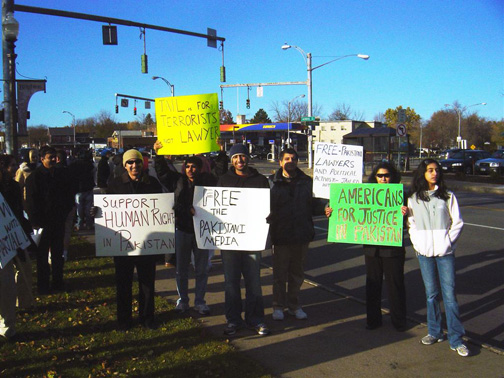writers and books’ initiative “if all of rochester read the same book” featured laila lalami’s “hope and other dangerous pursuits”. laila is a moroccan american writer based in california. her blog, which has been on my blog roll since day one, is a repository of information about books and writers, especially non-western writers who are mostly absent from mainstream best seller lists. laila came to rochester to talk about her book and i met her at the st john fisher college reading, a couple of weeks ago.
laila’s book is a panoramic narrative which explores the lives and hopes of four moroccans trying to make it across the straits of gibraltar into spain. the non-linear structure of the plot is a great hook. we start with a vivid scene showing complete strangers thrown into uncomfortable proximity. all the characters are here. this is our first encounter with each and everyone of them. they are cramped together into a lifeboat – illegals trying to get smuggled into spain. we can feel their anxiety, their desperation. we hear their thoughts. the landing is bungled and the characters are left to fend for themselves, struggling to make way in the dark, freezing water.
we then go back in time, pre-lifeboat. we get a peek into the lives of all four characters. we come to know them, understand them, sympathise with them. we become familiar with the realities of living in morocco – corruption, nepotism, red tape, non-existent upward mobility, political repression. many of these problems are characteristic of developing countries. i could immediately see the similarities with pakistan – the differences between various socio-economic classes, the corruption at every level of society, the dejection that comes with joblessness, the urgency to find a better life and become the hinge that pulls an extended family out of poverty. we also see the charm of simple lives unencumbered by greed. even in their most indulgent dreams, the characters wish only for basic comforts.
the final part of the book nudges us forward in time, post-lifeboat. here we see who made it and who didn’t and in the end, were they better off or not. laila’s writing is temperate, lucid, fluent. the book could have easily been three times its present size, packed with more details about the lives of its protagonists. but i like some of its open-endedness. like a great french film it lets you fill in the blanks and become part of the narrative. to me brevity and the natural, homespun quality of a story makes it all the more poetic.
in person, laila was animated and funny and refreshingly honest. she is passionate and not shy about expressing her views. she talked about morocco, the u.s., french colonialism, language and her love of words, the characters in the book and the process of writing.











